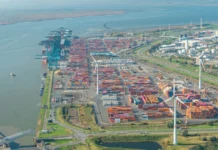
Smart Freight Centre (SFC), a global non-profit organization dedicated to reducing climate impacts in the freight sector, has partnered with FIATA International Federation of Freight Forwarders Associations—an influential voice in global freight forwarding and logistics representing over 40,000 logistics companies across 150 regions.
“As the global voice of freight logistics, FIATA is committed to leading the logistics industry towards more sustainable practices. This partnership with SFC is a crucial opportunity to equip FIATA Members with the best knowledge and tools necessary to drive meaningful reductions in emissions and foster long-term sustainability,” stated Stéphane Graber, FIATA Director General.
This partnership agreement was formalized on 26 September 2024, at the FIATA World Congress in Panama, marking a significant stride toward accelerating decarbonization efforts within the logistics industry and supporting the achievement of the Sustainable Development Goals.
As the first initiative under this collaboration, SFC and FIATA will introduce a co-branded emissions accounting training program. This training is designed to empower small and medium-sized logistics enterprises worldwide with the knowledge and tools to consistently measure their carbon impact and implement effective emission reduction strategies.
Furthermore, this partnership reflects a united commitment from SFC and FIATA to equip the logistics sector with essential resources to meet global decarbonization goals and contribute to sustainable development. The SFC Academy, SFC’s educational arm, will play a key role in delivering the training program.
Recognized as a global resource for organizations and freight professionals looking to expand their decarbonization expertise, the Academy is eager to work alongside FIATA to make this essential training widely accessible.
SFC’s Global Logistics Emissions Council (GLEC) program plays a central role in driving transparent and standardized greenhouse gas (GHG) emissions measurement and reporting. The GLEC Framework, created to provide a consistent method for multinationals and their suppliers to calculate and report logistics emissions, underpins the new ISO 14083 standard. This ISO standard now serves as an officially recognized global benchmark for calculating GHG emissions across transport and logistics chains.




